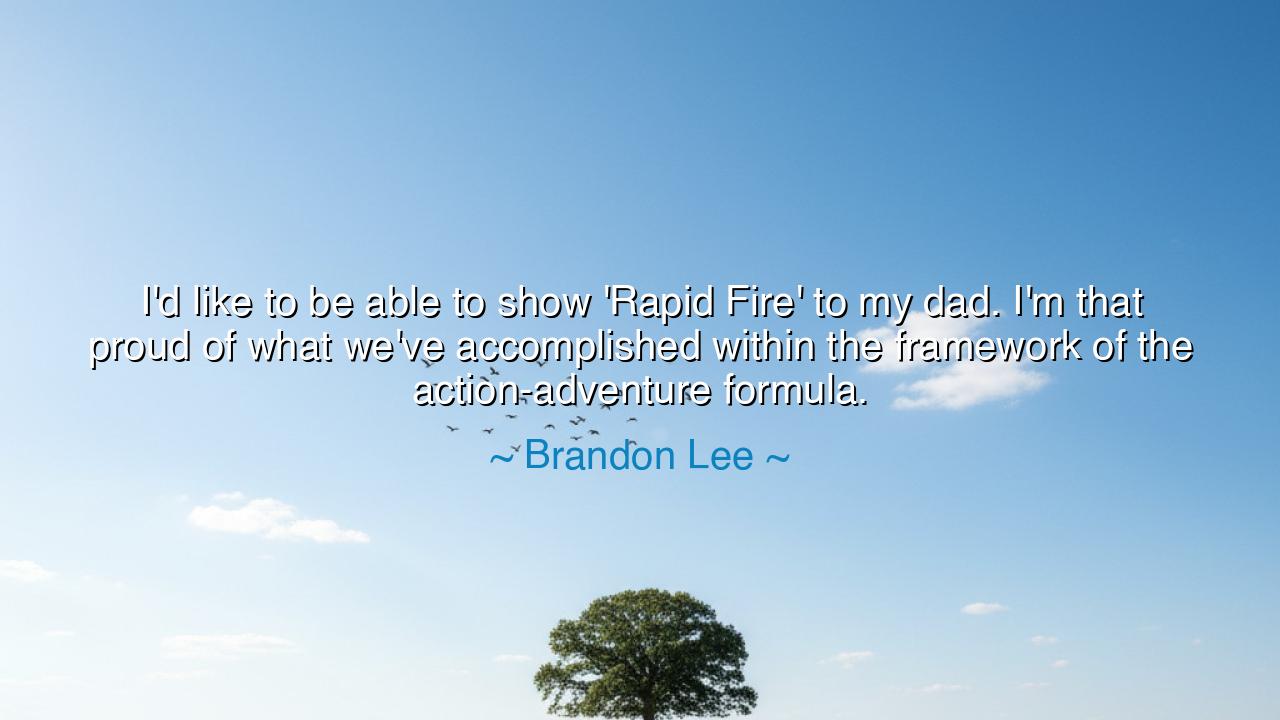
I'd like to be able to show 'Rapid Fire' to my dad. I'm that
I'd like to be able to show 'Rapid Fire' to my dad. I'm that proud of what we've accomplished within the framework of the action-adventure formula.






When Brandon Lee said, “I’d like to be able to show Rapid Fire to my dad. I’m that proud of what we’ve accomplished within the framework of the action-adventure formula,” his words shone with both pride and longing, the kind born from a son’s desire not only to achieve greatness but to be seen — truly seen — by the father who shaped his path. Beneath this statement lies a river of emotion: the ache of legacy, the quest for honor, and the eternal conversation between father and son, where love is spoken not always in words, but in the striving to live up to one another’s dreams. For Brandon, son of the legendary Bruce Lee, this was no simple wish; it was the voice of a man seeking to earn his own light, even as he carried the reflection of another’s.
The origin of this quote rests in the shadow and brilliance of two intertwined destinies. Bruce Lee, the martial arts icon who redefined cinema, died when Brandon was still a child. His legacy was both a torch and a weight — a symbol of excellence and expectation. Brandon, inheriting his father’s grace and discipline, knew that the world would measure him by that legend. And yet, in Rapid Fire, his first major leading role, he began to carve a path of his own. When he said he wished to show it to his father, he was not seeking approval — he was offering tribute. It was the gesture of a warrior-son, saying, “I have continued the journey you began. I have honored the craft, the spirit, the flame.”
The ancients would have recognized this feeling well, for the tension between legacy and individuality is as old as time. In Greek myth, Telemachus, the son of Odysseus, spent his youth searching not only for his father but for the man he himself was meant to become. His father’s deeds filled the world, but left no room for his own. Brandon, like Telemachus, walked that same path — the long road from admiration to self-realization. To wish to show one’s work to a departed father is not merely to seek praise, but to bridge the worlds of past and present, to unite blood and spirit through creation. In that yearning lies one of humanity’s oldest prayers: “May I live a life worthy of those who came before me.”
Yet Brandon’s words also carry another layer — one of craftsmanship and artistic pride. He speaks of what he and his collaborators “accomplished within the framework of the action-adventure formula.” These words reveal the heart of a true artist: one who finds meaning even within boundaries. Like the sculptor who works within the limits of stone, or the poet who bends his soul into meter and rhyme, Brandon saw no shame in the formula — he saw freedom within form. The ancients called this balance techne — the mastery of craft that allows the soul to express itself through discipline. He understood that greatness does not depend on breaking rules, but on filling familiar structures with spirit, truth, and heart.
There is a quiet heroism in such humility. Brandon did not claim to be inventing the genre anew; he celebrated the collective achievement of all who had labored with him — the writers, the stuntmen, the filmmakers, the crew. In this, he embodied the timeless virtue of gratitude. True creation is never solitary; it is born of unity. The Romans believed that every artist, every soldier, every craftsman was aided by a divine presence called the genius — a guiding spirit that visited those who worked with sincerity. Brandon, in speaking proudly of his film, spoke not just for himself, but for all who poured their hearts into it. His pride was not vanity, but reverence — the noble satisfaction of knowing one has done well what one was called to do.
Tragically, destiny would not grant Brandon the chance to share his work with his father in this life. But perhaps, as the philosophers of old would say, the spirit of the father never truly leaves the son. In every frame of his film, in every punch, every glance, there lived echoes of Bruce Lee’s discipline, his vision, his fire — now carried forward by a new soul. Like a candle lit from another’s flame, Brandon burned brightly for a time, reminding the world that legacy is not imitation, but continuation — that each generation must take the light handed to them and make it their own.
So, my listener, learn from this: be proud of what you build, even if the world compares it to what came before. Honor your teachers, your parents, your ancestors, but do not fear to add your own voice to their song. The greatest tribute to the past is not worship, but evolution. Whatever craft you pursue, do it with diligence and love, as Brandon did, and let that devotion speak for you — to the living and to the departed alike.
For in the end, to create something worthy of showing to those who shaped us — that is one of life’s highest callings. When you work with care, humility, and heart, you are writing your own chapter in the eternal story of humanity. And though those who inspired you may no longer walk beside you, their presence will live on in your actions, your art, and your courage. Like Brandon Lee, let your work be your offering — a bridge across time — and in that offering, know that you, too, have honored both your heritage and your soul.






AAdministratorAdministrator
Welcome, honored guests. Please leave a comment, we will respond soon